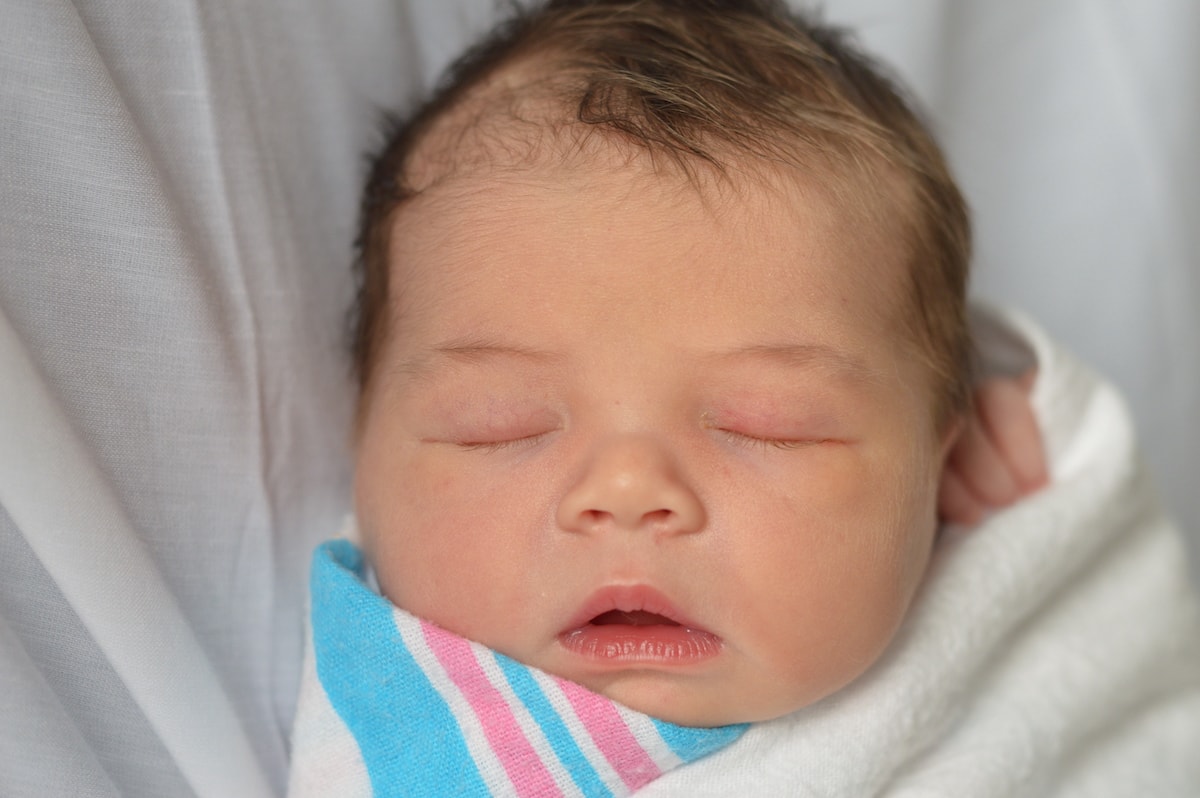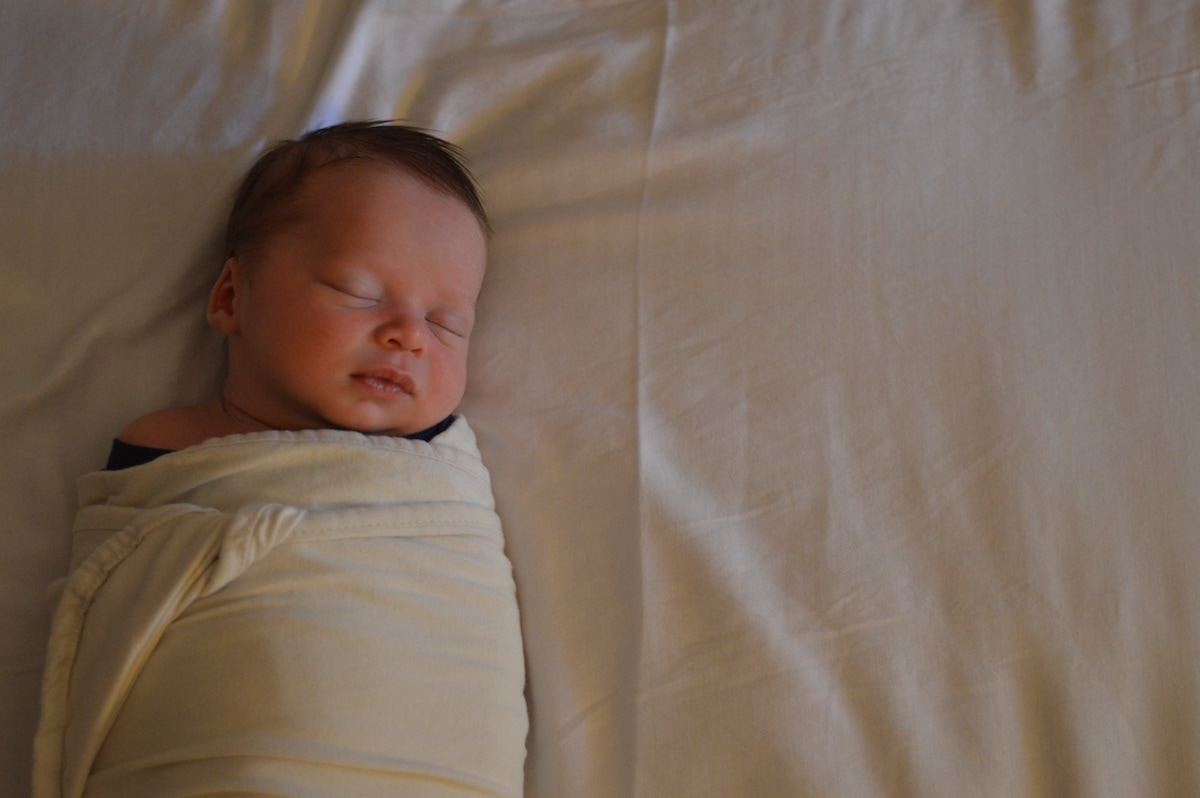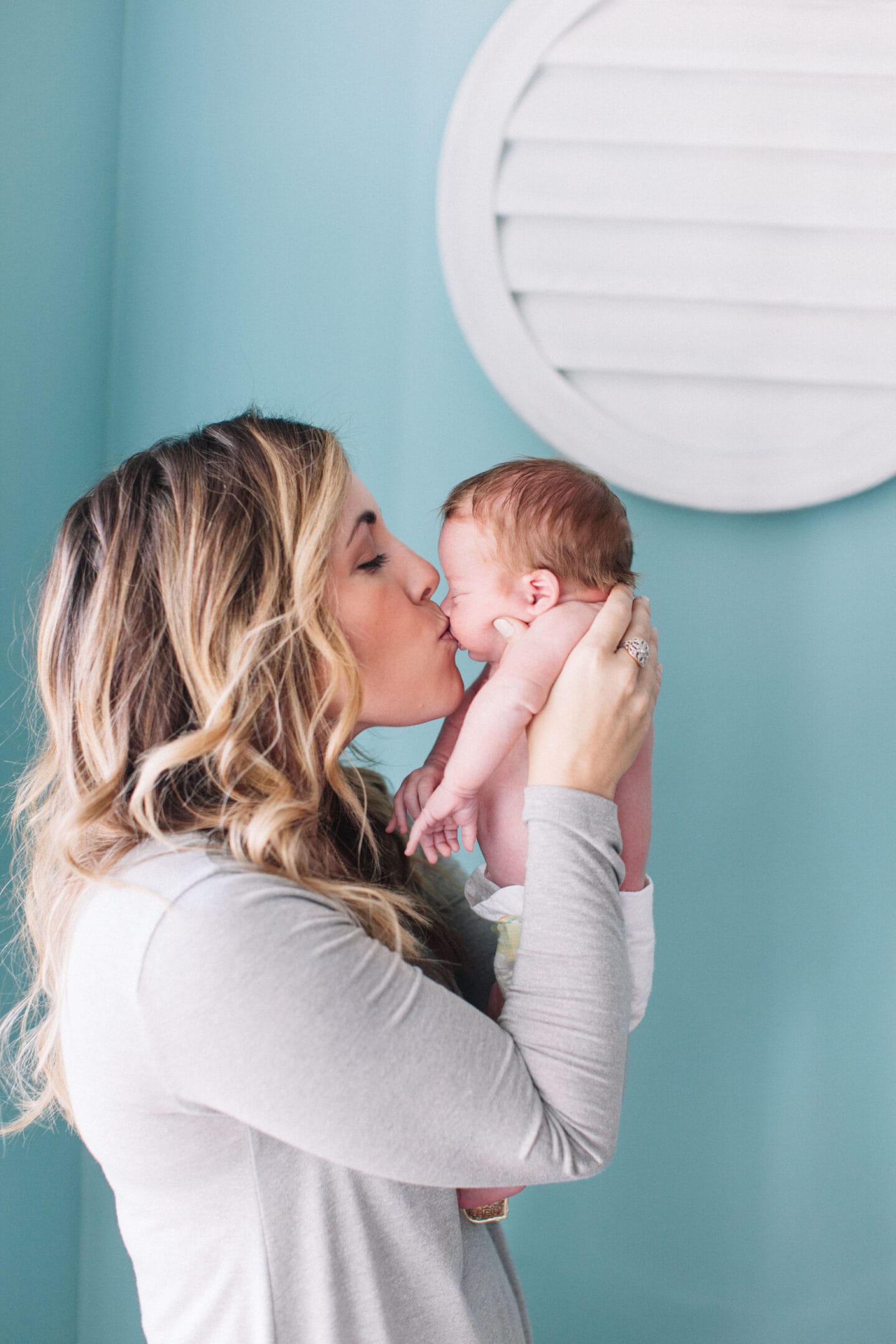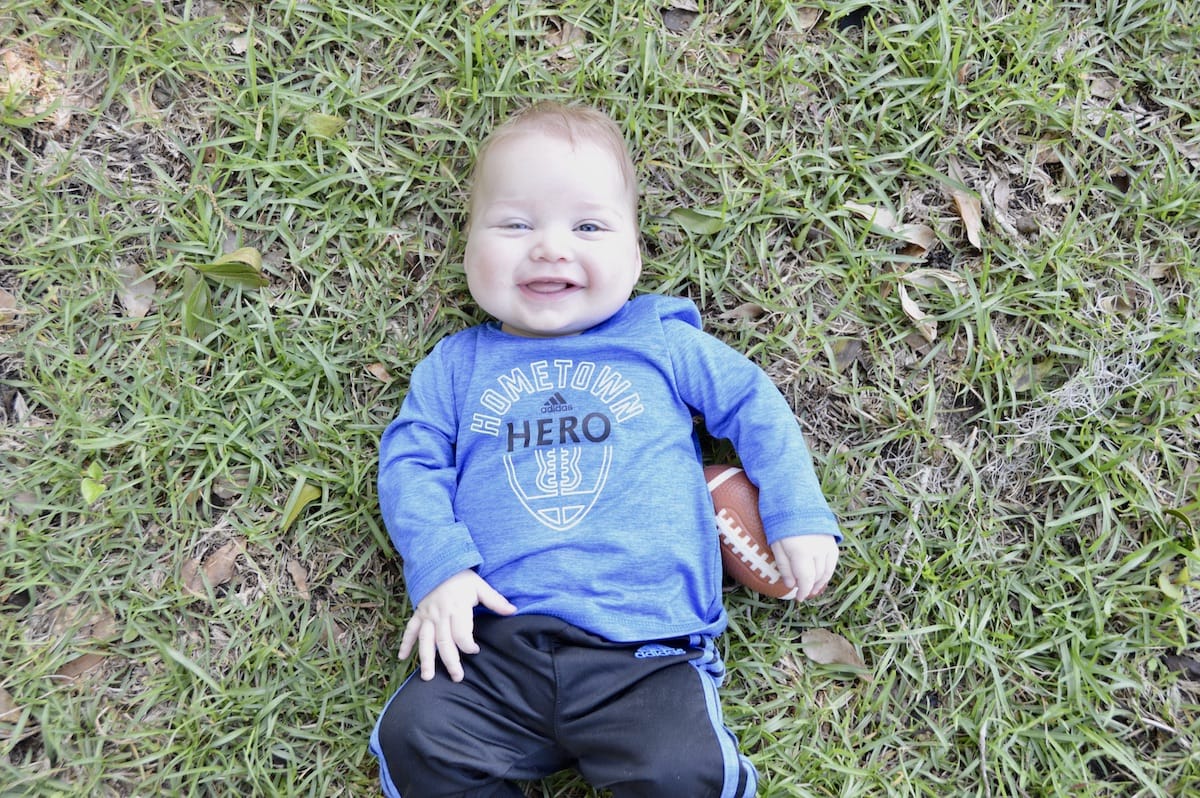As new parents, it’s a grand adventure. All of a sudden, you’ve got this little person to take care of, and it’s indescribably wonderful, but it’s not without its challenges! The newborn stage is definitely an adjustment, especially if it’s your first child. Having newborn summaries to refer to can help answer common questions and give you a foundation to build on as you learn and grow with your sweet child.
This newborn baby guide will cover day one until baby is three months of age. This technically makes up the “newborn” stage and is a time of joy, adjustment, learning, growth, and (of course) being really tired!
But the good news (or the bittersweet news, depending on how you look at it) is that it’s over before you know it. Each stage of the first year (and beyond) is magical in itself and presents its own unique challenges and triumphs. I’ll be covering them all in this series!
Here is a summary of the first twelve weeks of a baby’s life, from sleep schedules to major milestones plus some real-world examples from four different kids to help you navigate the world with your new baby!
Disclaimer: post contains affiliate links.

Newborn Summaries: The First Four Weeks
Bringing home a newborn, whether it’s your first or your fifth, is a huge life changer. The primary focus for those first few weeks of a baby’s life is regular feeding–newborns have to be fed every two to three hours.
They can handle very little wake time and sleep a lot. Newborns should get 14-17 hours of sleep a day (according to the National Sleep Foundation) and awake times at this point should be no longer than 45 minutes, and are typically often even shorter than that!
Yes, it is VERY normal for a newborn baby to be awake only long enough to have a diaper change and full feeding. Newborns sleep a LOT and it’s why it’s a great time to go ahead and begin to establish those good sleep habits as well as make sure Mom sleeps as much as possible too.
However, they also have a hard time staying awake during feeding.
Day and night confusion is common.
Gas pain can also present an extra level of challenge! (Trust me gas drops are gonna be your bff)
It is also tempting to start using a pacifier or another sleep/comfort aid for your baby but before introducing a paci be sure to read this post to help avoid sleep prop struggles down the road.
Your body will be in recovery from giving birth and the up and down feeding schedule means sleep is irregular at best; we all know that sleepless nights are the standard for those first weeks of life and a huge priority is making sure Mom gets as much rest as possible.
It’s also a great time to browse the internet while up for those late night feedings. Do you have everything you and baby need for successful sleep training? Be sure to check out this list of must-have sleep items!
This time is also about bonding with this brand new human, learning about each other, and sharing sweet moments together!

Newborn Sleep Schedules from Birth
It’s never too early to start establishing healthy sleep habits. I started following the Babywise method practically from the start and if you’ve been following Journey of Parenthood for a while, you already know how I feel about it. Safe to say, I highly recommend giving it a shot, but do know that you can adjust it to fit your and your baby’s needs!
The Babywise sleep schedule revolves around the eat wake sleep cycle and establishes a daily routine to promote healthy circadian rhythm and get baby sleeping better faster. Reading On Becoming Babywise is a game changer for implementing sleep training!

Here’s how to get started with Babywise!
These sample schedules for newborn babies will help you get an idea of what a typical 24-hour period might look like for baby’s sleep, wake times, and feeding schedule.
Speaking of feeding: wondering whether to go with breast milk or bottle feeding? Here is everything you need to know about the pros and cons of breastfeeding vs formula feeding!
Also, here’s everything you need to know about exclusively pumping if that’s something you’re considering, too!
The first two weeks are all about getting to know each other and focusing on full feedings. DO not overly be concerned with having your one or two week old baby sleep schedule established yet. Newborn sleep patterns are pretty easy to follow – if they have a full belly, they tend to SLEEP. If you focus on making sure baby gets those full feedings at each feeding session then baby will naturally fall into that 2-3 hour feeding schedule with very little effort required on your end!
At about two weeks old is when I recommend starting to truly schedule the day. It’s essential to begin the day at the same time each morning for that first feeding. The day flows from there!
For each age I am sharing a sample schedule that I used for one of my babies, I am also including links to each of their weekly summaries so you can have access to all FOUR schedules and a break down of each for reference.
If you are a mom of multiples I also think my schedules will be beneficial as it’s important to keep in mind the needs of your older children when developing a set routine for your new baby. That toddler sleep schedule is crucial too, right?
Baby Sleep Schedule at Two Weeks
- 7:00: Wake up for the day, 1st morning feeding. We do a diaper change after each feeding and have some awake time with her during the day.
- 8:00-10:00: Nap – put down for nap at first sign of sleepiness
- 10:00: 2nd feeding
- 11:00-1:00: Nap
- 1:00: 3rd feeding
- 2:00-4:00: Nap
- 4:00: 4th feeding
- 5:00-6:30: Nap
- 6:30: 5th feeding (Here I went 2 1/2 hours instead of three because this is a babies toughest time of the day and the fussiest)
- 7:30-9:00: Nap
- 9:00: Massage/Bath bedtime routine (I reversed the bedtime routine to be before she ate her last “meal” so she could go straight to bed after and I would nurse her to sleep basically at that feeding.)
- All other feedings I made sure to keep her awake and have awake time after the feeding! For the night feeds we change her diaper before she eats so she could go straight to sleep after eating
- 9:30: 6th feeding then straight to bed
- Whenever she woke up (typically around 3:30 or 4): 7th feeding, then straight to bed
Baby Sleep Schedule at Three Weeks
- 7:00: start of the day, eat
- 8:00-8:30: awake time then down for nap
- 10:00: eat
- 11:00-11:30: awake time then down for nap
- 1:00: eat
- 2:00-2:30: awake time then down for nap
- 4:00: eat
- 5:00-5:30: awake time then down for nap
- 6:00: eat (this is what Baby Whisperer Solves All Your Problems calls a cluster feed, I would feed her close together in the evenings to help her get a full feed for the night time. The evenings are also THE fussiest time of the day at this age so it makes sense to feed her and keep her happy!)
- 7:00-7:30: awake time then down for nap time
- 8:00: do bedtime ritual (massage or bath) then eat. Put her straight to bed after this feeding
- 10:30: wake her up for her “dream feed” (this is one extra night feeding before we go to bed to, again, help her stock up and hopefully sleep through the night).
For the full list of sample schedules from birth to six months, check this out!

Newborn Summaries Week 0-4: Four Different Children
During the infant stages of each of my children, I did a weekly post to summarize their growth and development. I have two boys and two girls, and of course, each of them were uniquely different!
These newborn summaries are intended to give you a first-hand perspective from a mom who’s “seen it all.” Maybe you’ll see similarities between one of my kiddos and your own!
Just keep in mind: while there are similarities week to week and month to month, every baby is very individual and my goal in sharing these summaries is to hopefully help you match up with a baby of mine that is similar to yours 🙂
Kye’s Summaries:
Britt’s Summaries:
Tess’s Summaries:
Spear’s Summaries:
Big Milestones to Expect During Weeks 0-4
- By week 1, baby already recognizes your voice! Talking to them is a soothing source of comfort.
- By week 2, baby can focus on objects about eight inches away from their face–they may start to notice you or track your face while nursing!
- By week 3, baby can start snuggling instead of jerking around. Enjoy those sweet times together!

Newborn Summaries: Weeks 4-8
The first month is down, and the baby’s sleep patterns are starting to take shape. If you’re having trouble and you’re wanting to help your infant get longer stretches of sleep, here’s how you can facilitate that!
This is also a time when many women experience postpartum depression. For me, it was around the 6 week marker when I started to notice the signs and symptoms.
If you are feeling down or struggling to feel the joy you want to feel, remember you’re not alone. MANY mamas have faced these same feelings! Don’t keep those concerns in, just by speaking them out loud it can be a HUGE step in helping you feel better!
Typically around this time you will have a follow-up visit with your OBGYN and this is a time to be open and honest about anything you may be feeling about your own mental and physical health. Trust me, they see and hear it ALL and they are here to HELP!
Also during this time breastfeeding struggles may arise, especially regarding supply dips.
Many mamas return to work six weeks after giving birth and it can be tricky to balance the schedule and pumping!
This is also a common time for Wonder Weeks to start creating chaos in the sleep routine for a baby. Don’t freak out – it means baby’s brain is going through a growth spurt!
While it sounds like this stage is straight up difficult in a lot of ways – it’s also a time when you’ll find yourself feeling more adjusted to life with baby and will feel more connected and bonded and start to see the unique personality of your baby shining through too.

Want More from a Keepin’ It Real Babywise Mama?
Sample Sleep Schedule for Weeks 4-8
Here is what your eat, wake, sleep schedule might look like by about week 6 (but is likely to be similar if not the same for one month olds all the way up to two months old!)
- 7:00: start of the day, change diaper, eat
- 8:00-8:30: change diaper, awake time
- 8:30-10:30: nap
- 10:30: eat
- 11:30-12:00: change diaper, awake time
- 12:00-2:00: nap
- 2:00: eat
- 3:00-3:30: change diaper, awake time
- 3:30-5:00: nap
- 5:00: eat (I did 3 hours here rather than 3 1/2 because we eat dinner as a family at 6. While this means I can’t actually cook the dinner, we can at least eat it together once my husband cooks it haha)
- 6:00-6:30: change diaper, awake time, family dinner
- 6:30-8:00: nap
- 8:00: awake, bath, ready for bed
- 8:15-9:15: eat
- 9:15-10:30: put to sleep straight from eating
- 10:30-11:30: dream feed (wake her up to feed her then put her right back to bed)
- She was waking up around 5:30 for a middle of the night snack then right back to sleep
This is a really critical time frame when it comes to being as consistent as possible. You are SO CLOSE to having your baby sleep through the night. Just keep sticking to the schedule and having baby take naps in their crib majority of the naps and soon you will get that full night of sleep you’ve been waiting for and working so hard towards!
Here are more tips for getting your baby to sleep longer stretches at night.

4-8 Week Summaries: 4 Examples
Here are the different experiences I recorded with all four of my children, in age order: Kye is my firstborn, then Britt, then Tess, then Spear, who is adopted–you can learn more about our adoption journey here!
Kye’s Summaries
(I wasn’t as consistent with Kye’s summaries… new blogger and new mom! :))
Britt’s Summaries
Tess’s Summaries
Spear’s Summaries
Developmental Milestones to Expect During Weeks 4-8
- At one month old, baby will start to make sounds other than crying, especially in response to you or Daddy!
- By week 6, your baby may start smiling at you!
- By week 7, baby’s five senses will start developing. They can recognize when sounds come from objects and can distinguish bright colors from black and white!

Newborn Summaries: Weeks 8-12
2-month-old babies are starting to handle longer awake times. Knowing how to spend this time can be a huge game changer! It’s a good idea to start introducing independent playtime, which teaches your baby how to entertain themselves. An extremely important and helpful skill, not just for Mama, but for their own development!
You can also check out the best toys for independent playtime and how to implement a pack-n-play into the routine for your 8-12 week old baby. Independent playtime has many benefits which also include providing an opportunity to spend some time with your older children while baby is happily playing without needing any adult intervention.
This is also the time when most parents start to experience the dreaded 45 minute intruder. Your little one goes down for nap like a dream. They fall asleep quickly, with little fussing. But then halfway into their daytime naps, they wake up and it seems impossible to get them back to sleep!
Here’s how to troubleshoot those issues and get them back into a deep sleep! Sometimes babies also experience the four month sleep regression a little early so if you think your baby sleep problems may have to do with sleep regressions read this post!
This age their temperament is much more clear and knowing your baby’s temperament can help in knowing how to best parent them too.
It’s fully possible to have your baby sleeping through the night by week 10. It happened with all four of my kiddos, so I know you can do it too! Here’s my guide on how to get your babies sleeping through the night!
Some babies require more sleep while some seem like they need very little. Wondering if your baby is a high or low sleep needs baby? Here’s how to tell the difference!
Hopefully reading through these baby sleep schedules help not only in establishing your baby sleep training and knowing your baby sleep needs but also in helping become aware of any baby sleep problems that may arise!
Many new parents may be tempted to hire a sleep consultant who may be advertising their extensive knowledge on baby sleep patterns and baby sleep needs and their claims that they can use their baby sleep training skills to establish your four week old sleep schedule and avoid any sleep regression concerns. But, trust me, I had FOUR babies who ALL had sound nighttime sleep at early ages and I just simply followed the schedules laid out in these blog posts – that you can access for free 🙂

Sleep Schedule for a 2-Month-Old Baby
- 7:00: start the day, change diaper, eat
- 8:00-8:30: change diaper, get dressed, awake time
- 8:30-10:30: nap
- 10:30-11:30: eat
- 11:30-12:00: change diaper, awake time
- 12:00-2:00: nap
- 2:00-3:00: eat
- 3:00-3:30: change diaper, awake time, alone time with Mommy
- 3:30-5:00: nap
- 5:00-6:00: eat
- 6:00-6:30: change diaper, awake time, family dinner
- 6:30-8:20: nap
- 8:20: awake, bath, put pjs on
- 8:30-9:30: eat, last feeding of day
- 9:30: put directly to bed after eating

Newborn Summaries By Child: Weeks 8-12
Here are my week-by-week newborn summaries for all four kids. As you can tell, Kye and Tess didn’t get Week 11 summaries, but that week will likely be pretty similar to the ones before and after it!
Kye’s Summaries
Britt’s Summaries
Tess’s Summaries
Spear’s Summaries

Big Milestones to Expect During Weeks 8-12
- Baby’s neck muscles will continue to strengthen by the time they’re two months old. They can’t support their own head yet, but they may be able to lift it up a little. Tummy time will help encourage them to practice!
- By week 9, baby is really attentive to sounds and they love high pitches especially. Cooing and baby talking at them is sure to delight them!
- By week 12, baby has become aware of their hands and it has rocked their world!
Other Posts to Check Out for More Information:
- Birth to 6 Month Babywise Schedules
- How to Start Babywise: Babywise Sleep Schedule Basics
- 12 Months of Baby Summaries
- Babywise and Sleeping Through the Night
- Infant Sleep Guide
- A Letter to my Son on His 16th Birthday From Mom (Kye’s Bday Letter) - March 20, 2025
- Open Letter to my Daughter on her 12th Birthday – Love, Mom {Britt’s 12th Bday Letter} - January 16, 2025
- Letter to My Son on his 6th Birthday – Love Mom - January 8, 2025






